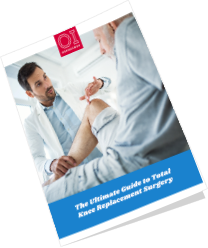This post is part of The Ultimate Guide to Total Knee Replacement
Certain injuries can cause broken kneecaps. The kneecap (or patella) is the bone located at the top of your knee, at the intersection of the thigh bone and shin bone. The kneecap serves to protect your knee joint and joins muscles from the thigh to the lower leg.
A broken kneecap, or a patellar fracture, is most likely to occur if your knee absorbs a fall or when it is forcibly hit. This can happen during a car accident if the knee hits the dashboard.
Read on to learn the types, symptoms, and treatments for broken kneecaps.
How can you tell if you have broken kneecaps?
If you have broken kneecaps, you will have knee pain and it will be challenging or potentially impossible to straighten your knee or walk. Symptoms of broken kneecaps include:
- Pain and swelling of the knee
- Bruising
- Unable to maintain a straight leg
Types of kneecap fractures
- Stable fracture: The kneecap is not displaced. In this case, you may not need surgery.
- Displaced fracture: The break doesn’t line up properly. This usually requires surgery to rejoin the bone.
- Comminuted fracture: The bone breaks in at least three places. This fracture could be stable or unstable.
- Open fracture: The skin is broken by either the bone or the injury goes through to the bone. Infection is more likely and urgent medical treatment is required.
A medical examination is required for any treatment of a broken kneecap. X-rays help determine the kind of fracture.
If the fracture is stable, a doctor will be needed to apply a cast or splint to immobilize the knee, allowing the kneecap to heal. A doctor will determine whether or not the knee can bear weight.
Do broken kneecaps require surgery?
Less severe broken kneecaps can be healed by casts or splints. It is more common for the kneecap to be displaced, resulting in a complex fracture that requires surgery.
If the kneecap is displaced, surgery is likely necessary. Open fractures typically require immediate surgery.
Types of fractures that may require surgery include:
- Transverse fracture: If the fracture is centrally located on the kneecap, surgery using a tension band or other implants to join two pieces of bone together is the usual course to fix the broken kneecap.
- Comminuted fracture: If the fracture is on the top or bottom of the kneecap, usually broken in many pieces, the surgeon will remove the bone fragments and reattach the tendon to the bone.
How long does it take to recover from a broken kneecap?
If your knee was immobilized, physical therapy may help get the knee back to normal by regaining strength and getting rid of stiffness.
Pain lasts anywhere from a few days to a couple weeks. Rest, ice, compression and elevation can help with the pain, as can over-the-counter pain relievers. A doctor may determine prescription pain medication is needed for a short duration if the pain is more intense. Opioid use should be limited to avoid pain medication dependency.
Specific recovery time is dependent on the severity of the injury, time for physical therapy, and whether or not surgery was required to fix the broken kneecap.
Learn more about joint replacement surgery at OrthoIndy
Schedule an appointment
Your well-being is important to us. If you have knee pain and are considering knee replacement surgery, schedule an appointment with one of our orthopedic specialists to review your options.
If your injury or condition is recent, you can walk right into one of our OrthoIndy Urgent Care locations for immediate care. For rehabilitation and physical therapy, no referral is needed to see one of our physical therapists.

The Ultimate Guide to Knee Pain Relief
Take control of your knee pain, learn about treatment options, and find out if surgery might be able to help you get back to normal.





